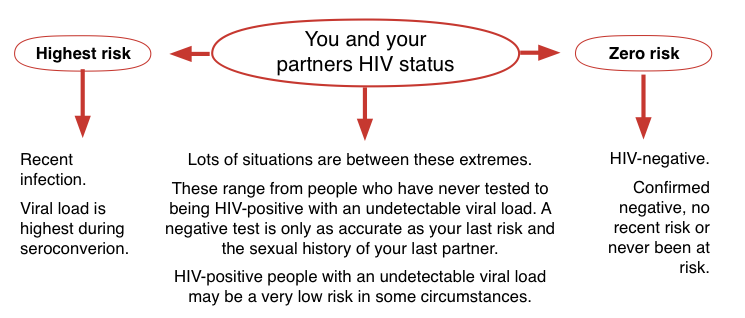Always use condoms made from latex or a synthetic material like polyurethane. Other STDs and Associated Conditions.
 Hiv Status Of You And Your Partners Guides Hiv I Base
Hiv Status Of You And Your Partners Guides Hiv I Base
The most effective way to prevent HIV transmission during sex is to use a condom.

I used a condom and still got hiv. A few STIs can be passed on simply through skin-to-skin contact for example genital warts but condoms also cut the risk of many of these. While the percentage of protection is on average 70 condoms still offer great protection against HIV. The results of these studies show that if a person with HIV is on ART with a completely suppressed HIV viral load.
If you use themcorrectly and strategicallythe percentage of protection could be even higher. There may be times when you have a high-risk exposure to HIV this means the chances of passing HIV are great and you cannot or did not protect yourself. In fact they are the only type of contraception that also stops you getting or giving STIs.
Using a latex male condom or a female condom can greatly reduce but not entirely eliminate the risk of HIV and STD transmission. Condoms do not have tiny tears that allow HIV to pass through. None of these substances can pass through an intact latex condom a polyurethane male condom or a polyurethane internal condom.
The only 100 effective way to prevent sexual transmission of HIV and STDs is through abstinence - avoiding all vaginal anal and oral sex. They have a very low failure rate and are effective for all forms of sex including oral and anal sex. Consistent and correct use of latex condoms is highly effective in preventing sexual transmission of HIV the virus that causes AIDS.
So even if a condom had sperm from an HIV-positive person in it it would not pose any risk. HIV is a virus that is carried in blood semen and vaginal fluids. While wearing a condom can.
A large body of scientific evidence shows that male latex condoms have an 80 or greater protective effect against the sexual transmission of HIV and other STIs. For perspective the Centers for Disease Control and Prevention reports flu vaccine effectiveness at around 59 percent this season. But the medicines are much less effective if you dont take them daily as prescribed and condoms can sometimes break or come off during vaginal sex.
HIV cant survive in air so you cant get it from sharing a space with someone who is. Consistent and correct use of latex condoms reduces the risk for many STDs that are transmitted by genital fluids STDs such as chlamydia gonorrhea and trichomoniasis. If you use them the right way every time you have sex condoms are highly effective in preventing HIV infection.
Condoms for HIV prevention Condoms when used correctly and consistently are highly effective in preventing HIV and other sexually transmitted infections STIs. During the study there were more than 12000 episodes of anal receptive sex which confer the highest risk of HIV transmission in which there was no use of condoms or PrEP. Outside of the body HIV in semen can only survive for a very short amount of time.
Its probably unrealistic to expect any method of. Using a condom lowers that risk by an average of 80. Get a condom ready before any sexual contact occurs since HIV.
Can I still prevent HIV infection. There were no HIV transmissions between the positive men on ART and their HIV-negative partners. Condoms are not 100 effective because they can be used improperly and rarely they fail.
Talk to your partners and friends about condoms. To use condoms to effectively prevent HIV its important to note the material of the condom. There are more HIV prevention options than ever before and condoms are still a highly effective option to prevent both HIV and other sexually transmitted diseases STDs.
According to sexologist Dr. No its not true. The condom slipped or broke during use.
Placing a condom on the penisor inside. When used correctly condoms provide excellent protection against HIV pregnancy and most STIs. Latex and internal condoms are the most effective way for people who have vaginal and anal intercourse to reduce the risk of HIV and other sexually transmitted infections.
The chance of HIV being passed on even though a condom was used is really quite tiny even if it isnt totally impossible. Your partner has HIV and you usually use condoms but didnt the last time you had sex. V Raina there is always a risk of transmission when you have sex with an HIV-positive person.
Oral sex poses little or no risk of HIV transmission. Condoms and medicine to prevent or treat HIV are highly effective at preventing HIV if used correctly. When used correctly every time you have sex condoms are the best way to prevent sexually transmitted infections STIs such as HIV.
